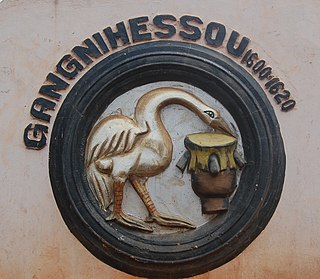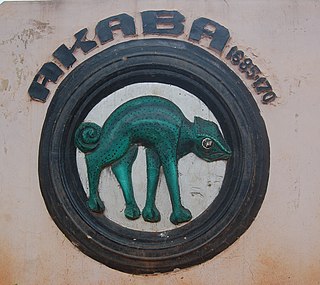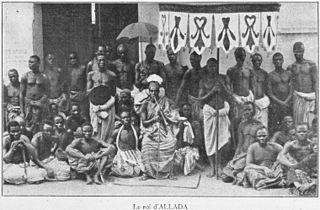
The Kingdom of Dahomey was a West African kingdom located within present-day Benin that existed from approximately 1600 until 1904. It developed on the Abomey Plateau amongst the Fon people in the early 17th century and became a regional power in the 18th century by expanding south to conquer key cities like Whydah belonging to the Kingdom of Whydah on the Atlantic coast which granted it unhindered access to the tricontinental triangular trade.

Do-Aklin or Gangnihessou or Dogbari is claimed as the founder of the Fon Kingdom of Dahomey in present-day Benin and the first person in the royal lineage of the Kings of Dahomey. In many versions he is considered the first king of Dahomey even though the kingdom was founded after his death. Very little is known about Do-Aklin and most of it is connected to folklore, but it is generally claimed that he settled a large group of Aja people from Allada on the Abomey plateau amongst the local inhabitants in c. 1620. His son Dakodonu would eventually build a palace on the plateau and began forming the Kingdom of Dahomey.

Dakodonou, Dakodonu, Dako Donu or Dako Danzo was an early king of the Kingdom of Dahomey, in present-day Benin, ruling from around 1620 until 1645. Oral tradition recounts that Dakodonu was the son of Do-Aklin, the founder of the royal dynasty of Dahomey, and the father to Houegbadja, often considered the founder of the Kingdom of Dahomey. In addition, it is said that Dakodonu killed a local chieftain and founded the capital city upon the site. However, some recent historical analysis contends that Dakodonu was added into the royal line in the 18th century to legitimize the ruling dynasty over the indigenous inhabitants of the Abomey plateau.

Houegbadja or Wegbaja or Aho was a King in the Kingdom of Dahomey, in present-day Benin, from around 1645 until 1685. Houegbadja followed his father Dakodonou to the throne and formed much of the administration and religious practices for the Kingdom of Dahomey. Because of this he is often credited as the First King of Dahomey.

Akaba also known as Adahunzo or Housseou was an early King of the Kingdom of Dahomey, in present-day Benin, from 1685 until c.1716. King Houegbadja had created the basic structure of the kingdom on the Abomey plateau. His first children were the twins of Akaba and Hangbe and they were followed by another son of Houegbadja who would become King Agaja. As the oldest son, Akaba became the king upon Houegbadja's death and ruled until 1716 when he died during battle in the Ouémé River Valley, either of small pox or in battle. When he died his sister, Hangbe, became the ruler and began preparing Akaba's oldest son, Agbo Sassa, for the throne. In 1718, Agaja, the next oldest son after Akaba from Houegbadja, fought with Agbo Sassa and Hangbe and became the next King of Dahomey.

Agaja was a king of the Kingdom of Dahomey, in present-day Benin, who ruled from 1718 until 1740. He came to the throne after his brother King Akaba. During his reign, Dahomey expanded significantly and took control of key trade routes for the Atlantic slave trade by conquering Allada (1724) and Whydah (1727). Wars with the powerful Oyo Empire to the east of Dahomey resulted in Agaja accepting tributary status to that empire and providing yearly gifts. After this, Agaja attempted to control the new territory of the kingdom of Dahomey through militarily suppressing revolts and creating administrative and ceremonial systems. Agaja died in 1740 after another war with the Oyo Empire and his son Tegbessou became the new king. Agaja is credited with creating many of the key government structures of Dahomey, including the Yovogan and the Mehu.

Tegbesu or Bossa Ahadee was a king of the Kingdom of Dahomey, in present-day Benin, from 1740 until 1774. While not the oldest son of King Agaja (1718-1740), he became king after Agaja's death following a succession struggle with a brother.
Adandozan was a king of the Kingdom of Dahomey, in present-day Benin, from 1797 until 1818. His rule ended with a coup by his brother Ghezo who then erased Adandozan from the official history resulting in high uncertainty about many aspects of his life. Adandozan took over from his father Agonglo in 1797 but was quite young at the time and so there was a regent in charge of the kingdom until 1804. Dealing with the economic depression that had defined the administrations of his father Agonglo and grandfather Kpengla, Adandozan tried to reduce slavery to decrease European trade, and when these failed reform the economy to focus on agriculture. Unfortunately, these efforts did not end domestic dissent and in 1818 at the Annual Customs of Dahomey, Ghezo and Francisco Félix de Sousa, a powerful Brazilian slave trader, organized a coup d'état and replaced Adandozan. He was left alive and lived until the 1860s hidden in the palaces while he was largely erased from official royal history.

Béhanzin is considered the eleventh King of Dahomey, modern-day Republic of Benin. Upon taking the throne, he changed his name from Kondo.

Abomey is the capital of the Zou Department of Benin. The commune of Abomey covers an area of 142 square kilometres and, as of 2012, had a population of 90,195 people.

The Annual Customs of Dahomey were the main yearly celebration in the Kingdom of Dahomey, held at the capital, Abomey. These ceremonies were largely started under King Agaja around 1730 and involved significant collection and distribution of gifts and tribute, religious ceremonies involving human sacrifice, military parades, and discussions by dignitaries about the future for the kingdom.

The Fon people, also called Fon nu, Agadja or Dahomey, are a Gbe ethnic group. They are the largest ethnic group in Benin found particularly in its south region; they are also found in southwest Nigeria and Togo. Their total population is estimated to be about 3,500,000 people, and they speak the Fon language, a member of the Gbe languages.
The Aja or Adja are an ethnic group native to south-western Benin and south-eastern Togo. According to oral tradition, the Aja migrated to southern Benin in the 12th or 13th century from Tado on the Mono River, and c. 1600, three brothers, Kokpon, Do-Aklin, and Te-Agbanlin, split the ruling of the region then occupied by the Aja amongst themselves: Kokpon took the capital city of Great Ardra, reigning over the Allada kingdom; Do-Aklin founded Abomey, which would become capital of the Kingdom of Dahomey; and Te-Agbanlin founded Little Ardra, also known as Ajatche, later called Porto Novo by Portuguese traders and the current capital city of Benin.

The Dahomey Amazons were a Fon all-female military regiment of the Kingdom of Dahomey that existed from the 17th century until the late 19th century. They were the only female army in modern history. They were named Amazons by Western Europeans who encountered them, due to the story of the female warriors of Amazons in Greek mythology.

Allada is a town, arrondissement, and commune, located in the Atlantique Department of Benin.

The following outline is provided as an overview of and topical guide to Benin:

The Royal Palaces of Abomey are 12 palaces spread over an area of 40 hectares at the heart of the Abomey town in Benin, formerly the capital of the West African Kingdom of Dahomey. The Kingdom was founded in 1625 by the Fon people who developed it into a powerful military and commercial empire, which dominated trade with European slave traders on the Slave Coast until the late 19th century, to whom they sold their prisoners of war. At its peak the palaces could accommodate up to 8000 people. The King's palace included a two-story building known as the "cowrie house" or akuehue. Under the twelve kings who succeeded from 1625 to 1900, the kingdom established itself as one of the most powerful of the western coast of Africa.
The History of the Kingdom of Dahomey spans 400 years from around 1600 until 1904 with the rise of the Kingdom of Dahomey as a major power on the Atlantic coast of modern-day Benin until French conquest. The kingdom became a major regional power in the 1720s when it conquered the coastal kingdoms of Allada and Whydah. With control over these key coastal cities, Dahomey became a major center in the Atlantic Slave Trade until 1852 when the British imposed a naval blockade to stop the trade. War with the French began in 1892 and the French took over the Kingdom of Dahomey in 1894. The throne was vacated by the French in 1900, but the royal families and key administrative positions of the administration continued to have a large impact in the politics of the French administration and the post-independence Republic of Dahomey, renamed Benin in 1975. Historiography of the kingdom has had a significant impact on work far beyond African history and the history of the kingdom forms the backdrop for a number of novels and plays.
Hangbe was a woman who served as the regent of the Kingdom of Dahomey for a brief period before Agaja came to power in 1718. According to oral tradition, she became regent upon the sudden death of King Akaba because his oldest son, Agbo Sassa, was not yet of age. The duration of her regency is unclear. She supported Agbo Sassa in a succession struggle against Agaja, who ultimately became king. Hangbe's legacy lives on in oral tradition, but little is known about her rule because it was largely erased from official history. It is possible that her gender and role as a woman in power contributed to her rule being erased from official history.
The Kingdom of Ardra, also known as the Kingdom of Allada, was a coastal West African kingdom in southern Benin. While historically a sovereign kingdom, in present times the monarchy continues to exist as a non-sovereign monarchy within the republic of Benin.




















